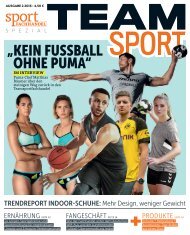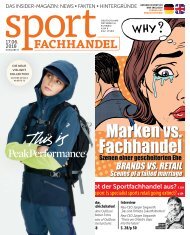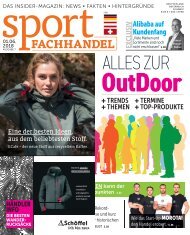sportFACHHANDEL 02_2018 Leseprobe
- Keine Tags gefunden...
Sie wollen auch ein ePaper? Erhöhen Sie die Reichweite Ihrer Titel.
YUMPU macht aus Druck-PDFs automatisch weboptimierte ePaper, die Google liebt.
2.<strong>2018</strong> Report<br />
Report | WINTER | 63<br />
mechatronics engineer”, Leodolter explains:”<br />
It’s about electronics, pneumatics, about highly<br />
technical, highly complex machines. So the job<br />
encompasses way more than what a conventional<br />
knitter does.”<br />
Löffler was awarded with the INEO award for the<br />
high commitment in training the apprentices, the<br />
responsible support in vocational development<br />
and the high training quality in November 2016.<br />
Recruitment problems aren’t known to them: ”We<br />
are known as a brand and as a good employer in the<br />
region”, Leodolter goes on. “Of course it is easier for<br />
us due to that, too. But one also has to be active:<br />
For example we present ourselves at apprentice<br />
exhibitions, we offer trial days, are present in the<br />
media and many more.”<br />
Additionally the flexibility within the apprenticeship<br />
ensures attractive work places: ”We try to<br />
shape the apprenticeship in a way that allows<br />
the employee to work in many different stations.<br />
That’s good for the future but is also within our<br />
interests since we don’t continuously produce the<br />
same products either after all. We have winter and<br />
summer materials. In that case we need different<br />
techniques, different machines, different work<br />
processes …”<br />
By this, special talents can be detected and nurtured<br />
early as well. The newest example: Durina Lezi was<br />
already very interested in the important CAD area<br />
during her apprenticeship, a key section in every<br />
textile processing company since this is where the<br />
basis is built for cutting the fabrics as efficiently as<br />
possible. Meanwhile she has been working in this<br />
responsible position for five years.<br />
An outsouring to the Far East was never a serious<br />
topic at Löffler: “Even as many companies migrated<br />
in the late 80s and early 90s our business manager at<br />
that time always had the mindset that one could also<br />
survive well in a location as Ried”, Reinhard Hetzeneder<br />
remembers. The only decision made then<br />
was to create further capacities in Eastern Europe<br />
which were dearly needed due to the bike boom at<br />
the time. “It was our philosophy to keep the location<br />
in Ried and to also continuously invest in buildings,<br />
machines and so on there but to stem the growth in<br />
production with wage partners in Hungary first, later<br />
Bulgaria – well-knowing we wouldn’t be able to reach<br />
countless margins that way.”<br />
Meanwhile Löffler has taken over the production in<br />
Bulgaria itself in order to hold sway over the capacities<br />
and production conditions itself. The number<br />
of employees has already been increased from 40<br />
to 80 and a new building is in the process of being<br />
planned. “In this case it is about the topics of safety,<br />
quality, timeliness but also about the employees<br />
on-site”, says Hetzeneder. “Bulgaria is a member of<br />
the EU”, Otto Leodolter adds. “Of course we can only<br />
keep the employees there, too, when we pay them<br />
reasonably and also provide appropriate security.”<br />
But one thing remains clear to the traditional<br />
business: Ried remains the main location! That is<br />
where quite literally all the threads come together.<br />
This is where the fabrics are produced, the pattern<br />
is prepared and partly made-to-measure work is<br />
done. The product development exclusively takes<br />
place in Ried in order to always be able to cover the<br />
product groups vital to Löffler with best possible<br />
quality. And in order to guarantee a quickest<br />
possible re-order: ”We have stored so much fabric<br />
that we could deliver four to five thousand textile<br />
products within a week without problems,” Hetzeneder<br />
proudly says.<br />
“Furthermore patterns are also an important topic.<br />
We possess a special pattern system that has been<br />
developed for decades. The European customer<br />
is definitely in our main focus. We don’t need a<br />
worldwide unisex pattern which ultimately doesn’t<br />
fit anyone anymore. A pair of trousers has to fit –<br />
especially in sports!”<br />
„Of course it is expensive to produce in Austria“,<br />
Otto Leodolter summarises. “But our proprietors<br />
and we ourselves are satisfied with a slightly smaller<br />
margin on our products.” And the CEO is also<br />
convinced that the customer honours that and is<br />
therefore prepared to pay a higher price for it. “We<br />
keep discussing prices in the textile branch which<br />
bear no relation to the worth they should actually<br />
have any more. Most don’t think about the price<br />
at the petrol station either when they fill up their<br />
tank. But when it comes to a jacket they haggle over<br />
every Euro! We are trying to bring the worth back<br />
into awareness with our “Made for Better” campaign<br />
for example. And we invite customers. We show<br />
them how many hand movements are needed in order<br />
to produce a proper fabric. Then many retailers<br />
also understand the worth – and the price.”
















